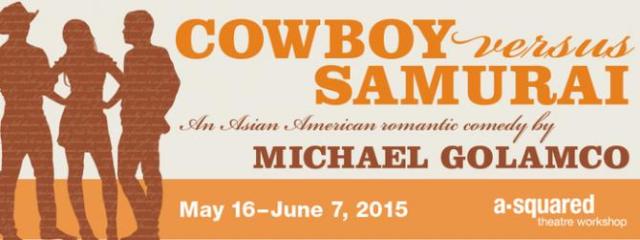
Volumes have been written about the struggle of young white men to find their own identity, as opposed to that imposed upon them by their families, culture or social position. Non-WASP males in fiction, by contrast, are assumed to be so secure within their communities that even the inevitable adolescent restlessness never disturbs the tribal solidarity. (Females in fiction, no matter what their lineage, usually bypass this rebellious stage of growth altogether, but that's another topic.) This is why Michael Golamco's candor in Cowboy versus Samurai comes as such a refreshing refutation of the stereotypes audiences have come to expect.
Breakneck, Wyoming, is a town with a population of 1,000 citizens, most of them employed in rural industries. Its high school English teacher is Travis Park, a Korean-American from Los Angeles who left in search of peace and quiet. His best friend, Chester, is the only other Asian in the region, confusion over his pre-adoption ancestry leading him to embrace a nebulous racial heritage rooted in Hollywood images.
The new biology teacher is Veronica Lee, a Korean-American singleton from New York City (the Flushing district in Queens, to be specific), who hopes to cultivate strength through solitude at the post chosen for her by a government program providing instructors for the educationally underserved. Oh, and by the way—she dates only blue-eyed, blond muscleheads like P.E. coach Del, who lives on his dad's horse farm and smokes dope a lot.
Golamco endows his characters with plenty of individualizing quirks as he sets us up for one of the most reliable rom-com plots in western literature. His evocation of teenage-nerd buffoonery may be distracting initially, but the humorous tone soon gives way to discussions of internalized prejudice and its effect on personal autonomy, often conducted in a take-no-prisoners idiom rarely heard outside of the most intimate circles. (Our harshest epithets are always reserved for those who refuse to conform to our fantasies, aren't they?)
Cary Shoda and Aja Wiltshire make a suitably sensitive pair of comrades, while Jin Kim and Chris Lysy lend a sympathetic vulnerability to Chester and Del's clownish antics. Director Marc Rita purports to have introduced elements of Japanese Noh Theater into this production for A-Squared Theater, but apart from the bare-stage scenic design and the propensity of actors to face us, rather than each other, this conceptual affectation does nothing to obstruct our undiluted approval at the characters finishing, if not precisely content yet, at least no longer mired down in their own insecurities.
